 Previous Page Next Page
Previous Page Next Page
This wizard appears when you click Insert > Banded Object in a report. It helps you to create a banded object in the report, and varies with the data resource type used to create the banded object: business view or query resource.
Back
Goes back to the previous screen.
Next
Goes to the next screen.
Finish
Finishes creating the banded object and closes this wizard.
Cancel
Does not retain changes and closes this wizard.
Help
Displays the help document about this feature.
When the wizard is used for creating a banded object using a business view, it consists of the following screens: Data, Display, Group, Summary, Filter and Style.
The screen lists all the predefined business views in the current catalog. Select the one using which to create the banded object.
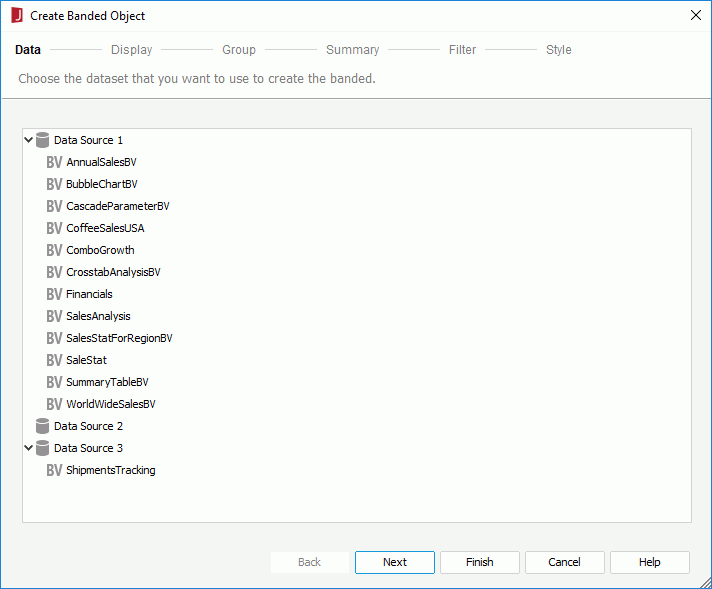
Specifies the detail fields to display in the banded object.
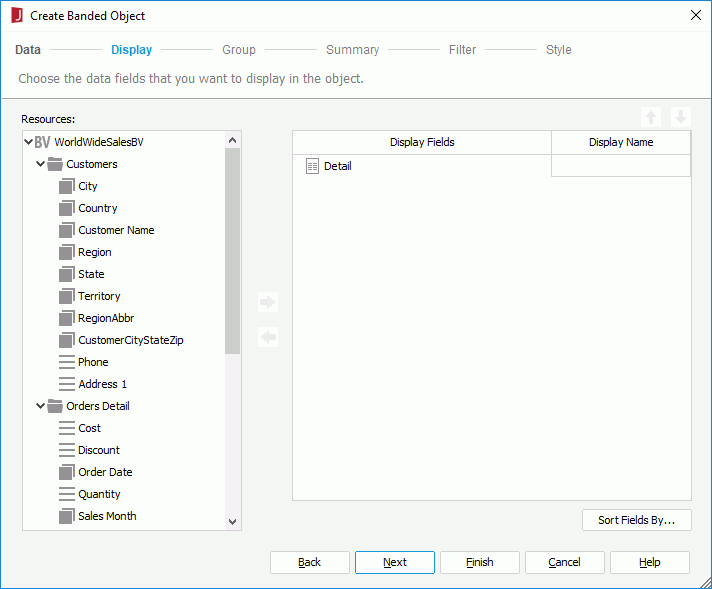
Resources
Lists the resources in and related to the specified business view, which can be used as detail fields in the banded object.

Adds the selected field in the Resources box to the banded object.

Removes the selected field from the banded object.

Moves the selected field one step up.

Moves the selected field one step down.
Display Fields
Lists the detail fields of the banded object.
Display Name
Specifies the labels of the detail columns in the banded object, which by default are the display names of the added fields. You can click in the text boxes to edit the labels, or check the Auto Map Field Name checkboxes in the text boxes to automatically map the label text to the dynamic display names of the fields at runtime.
Sort Fields By
Opens the Sort Fields By dialog to specify how to sort the detail data in the banded object.
Specifies the criteria for grouping data in the banded object.
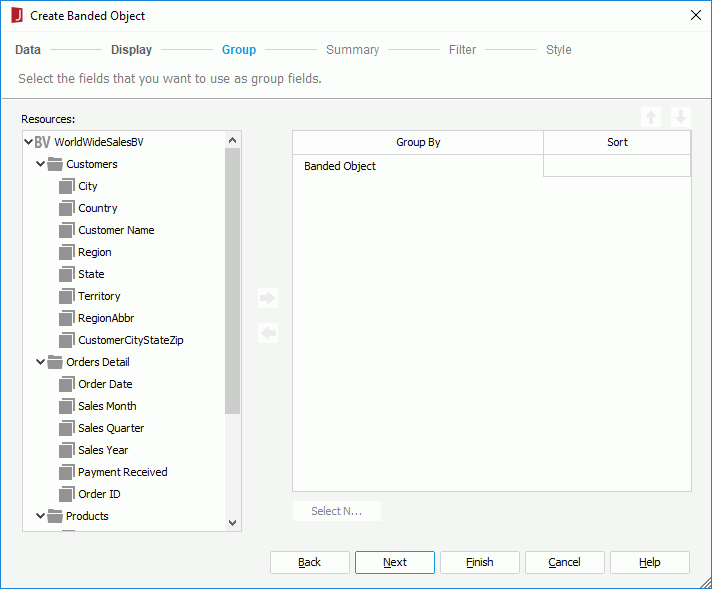
Resources
Lists the resources in and related to the specified business view, which can be used as group-by fields in the banded object.

Adds the selected field in the Resources box as a group-by field in the banded object.

Removes the selected group-by field from the banded object.

Moves the selected group one step up.

Moves the selected group one step down.
Group By
Lists the group-by fields of the banded object.
Sort
Specifies how groups at the specific group level will be sorted.
Select N
Opens the Select N dialog to specify the Select N condition.
Specifies the summaries to calculate data in the banded object.
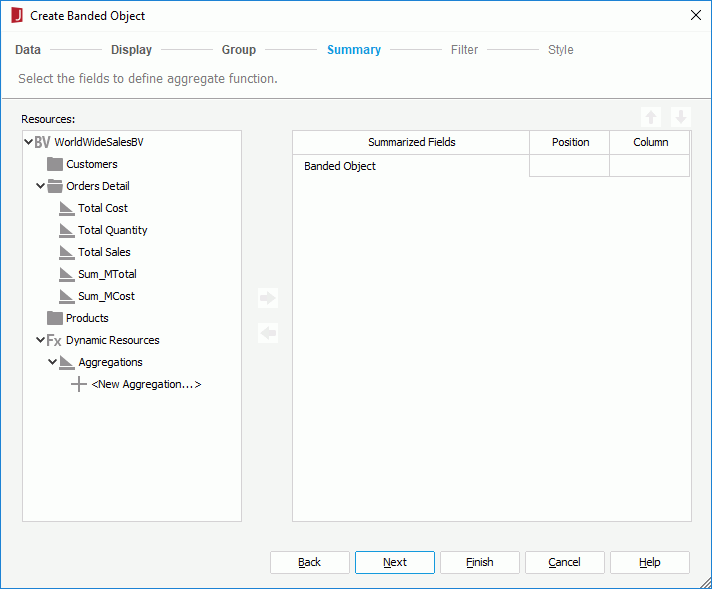
Resources
Lists the resources in and related to the specified business view, which can be used to calculate data in the banded object.

Adds the selected field in the Resources box to calculate data in the banded object.

Removes the selected summary from the banded object.

Moves the selected summary one step up.

Moves the selected summary one step down.
Summarized Fields
Lists the fields added to calculate data in the banded object.
Position
Displays the position of the summaries. A summary added for a group level is placed in the group's footer panel; if added for the Banded Object level, it will be placed in the banded footer panel.
Column
Displays in which column to place the summaries. By default the summaries and their name labels will be placed in the first two detail columns.
Specifies to filter data displayed in the banded object. The options in the screen are the same as those in the Edit Filter dialog.
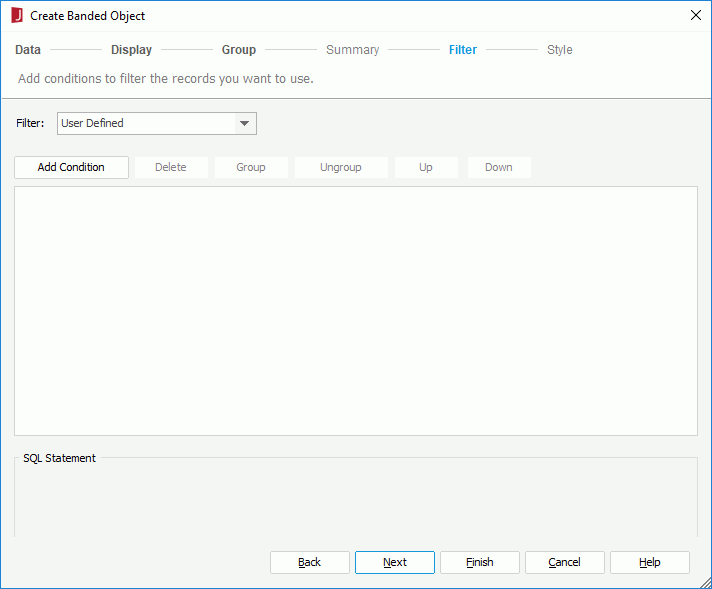
Specifies the style of the banded object.
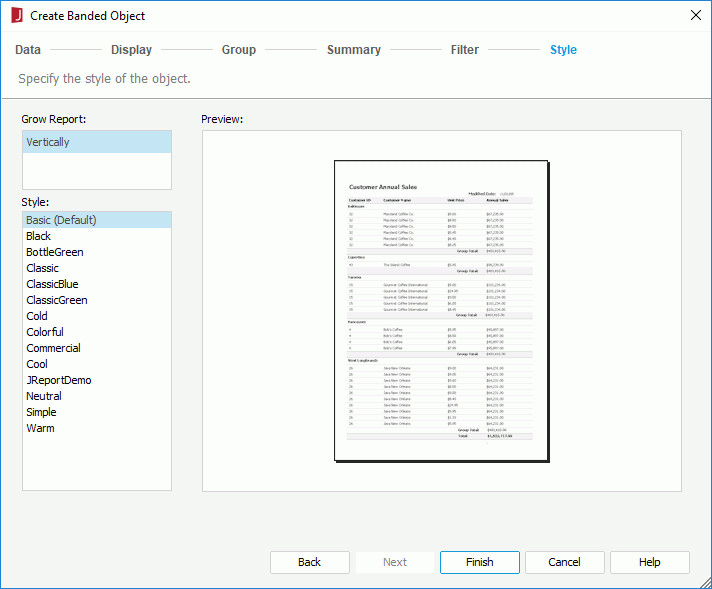
Grow Report
Specifies the layout of the banded object.
Style
Specifies the style of the banded object.
Preview
Displays a diagram illustrating the effect of the selected style on the banded object.
Inherit Style
Specifies whether to make the banded object take the style of its parent. Available only when the banded object is to be inserted into another banded object in a page report.
When the wizard is used for creating a banded object using a query resource, it consists of the following screens: Data, Display, Group, Summary, Filter and Style.
Specifies the dataset using which to create the banded object.
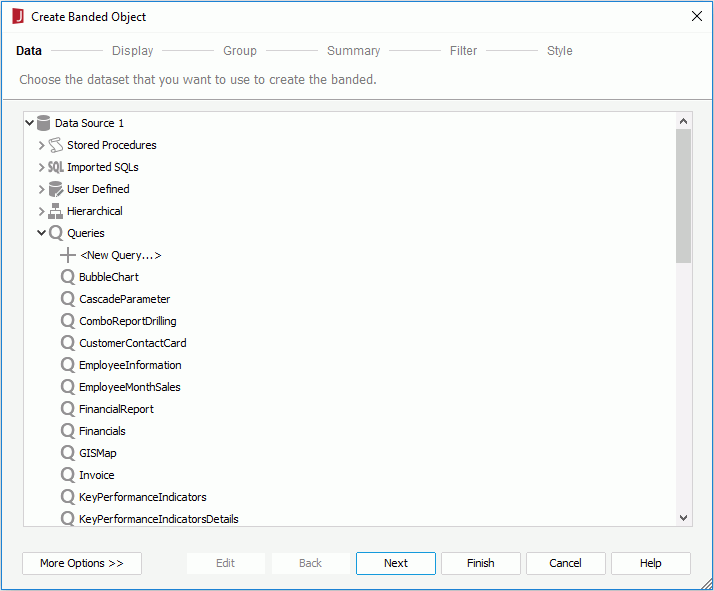
Data resource box
Lists the predefined data resources in the current catalog. Select one and a dataset based on it is created automatically for the banded object.
More Options/Less Options
Shows or hides the dataset selection panel to choose a dataset for the banded object.
Specifies the detail fields to display in the banded object.
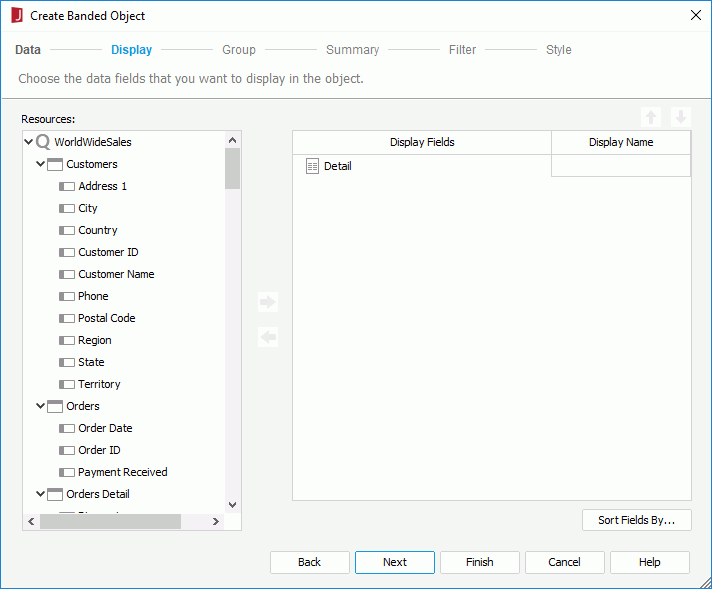
Resources
Lists the resources in and related to the specified dataset, which can be used as detail fields in the banded object.

Adds the selected field in the Resources box to the banded object.

Removes the selected field from the banded object.

Moves the selected field one step up.

Moves the selected field one step down.
Display Fields
Lists the detail fields of the banded object.
Display Name
Specifies the labels of the detail columns in the banded object, which by default are the display names of the added fields. You can click in the text boxes to edit the labels if required.
Sort Fields By
Opens the Sort Fields By dialog to specify how to sort the detail data in the banded object.
Specifies the criteria for grouping data in the banded object.
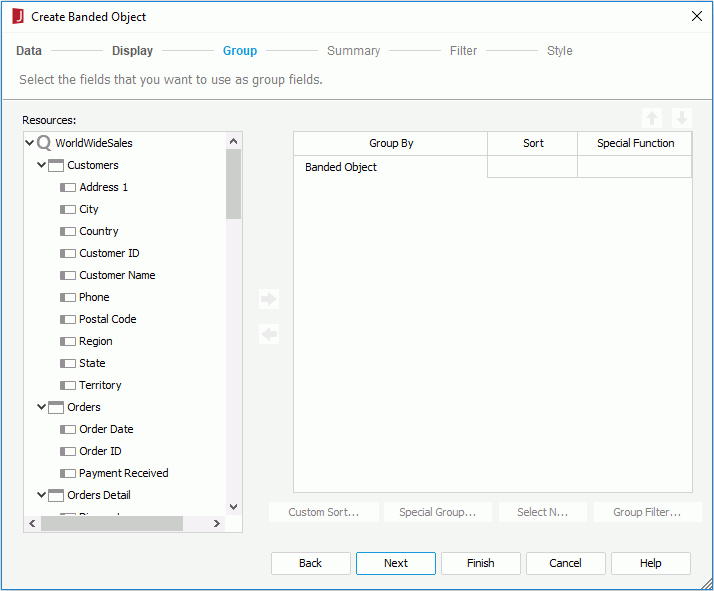
Resources
Lists the resources in and related to the specified dataset, which can be used as group-by fields in the banded object.

Adds the selected field in the Resources box as a group-by field in the banded object.

Removes the selected group-by field from the banded object.

Moves the specified group one step up.

Moves the specified group one step down.
Group By
Lists the group-by fields of the banded object.
Sort
Specifies how groups at the specific group level will be sorted.
Special Function
For a group-by field of the Numeric/String/Date/Time type, you can select a special function for it to specify to which level data will be grouped by. Select Customize to set the function in the Customized Function dialog.
Custom Sort
Specifies how to sort the groups. Activated only when you have selected Custom Sort from the Sort column to define the sort manner of groups for the selected group level.
Special Group
Specifies how to group your information. Activated only when you have clicked Special Group from the Sort column to define a special group.
Select N
Opens the Select N dialog to specify the Select N condition.
Group Filter
Opens the Group Filter dialog to specify the group filter condition.
Specifies the fields on which to create summaries in the banded object.
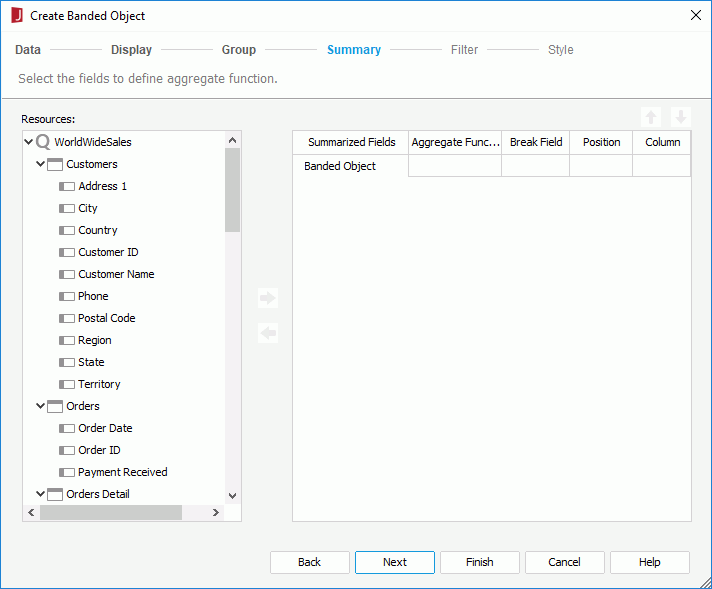
Resources
Lists the resources in and related to the specified dataset, which can be used to create summaries in the banded object.

Adds the selected field in the Resources box based on which to create a summary in the banded object.

Removes the selected summary from the banded object.

Moves the selected summary one step up.

Moves the selected summary one step down.
Summarized Fields
Lists the fields that have been added to create summaries in the banded object.
Aggregate Function
Specifies the aggregate functions used for the summaries.
Break Field
Displays the groups on which the summaries will be calculated. If a summary is added for the Banded Object level, the break field is null and the summary will be calculated on the whole dataset.
Position
Works together with the Column option to specify the location where a summary will be placed.
Column
Works together with the Position option to specify the location where a summary will be placed.
Specifies to filter data displayed in the banded object. The options in the screen are the same as those in the Edit Filter dialog.
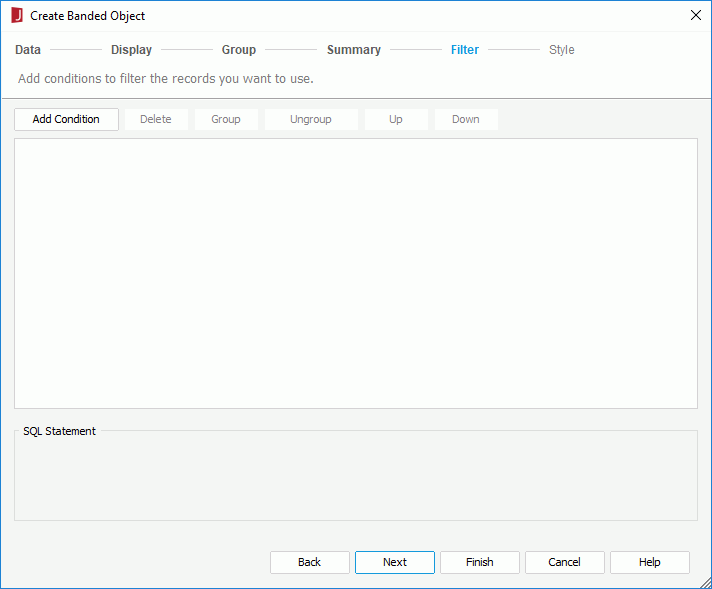
Specifies the layout and style of the banded object.
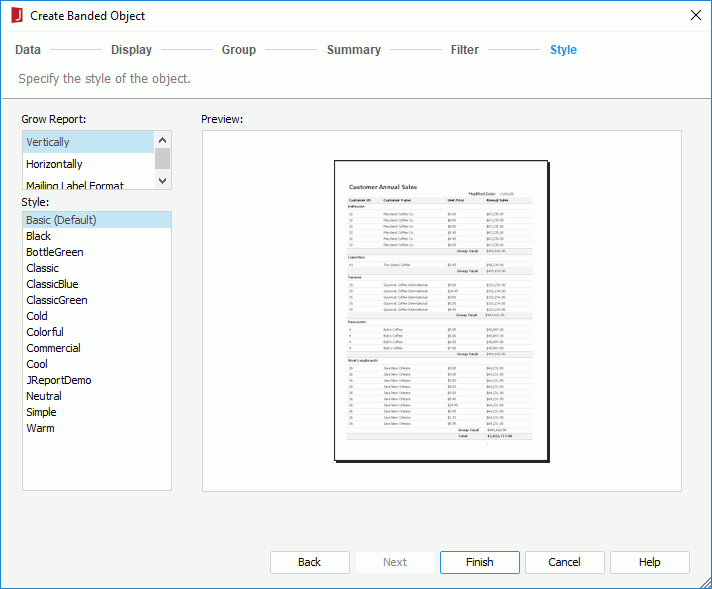
Grow Report
Specifies the layout of the banded object.
Style
Specifies the style of the banded object.
Preview
Displays the selected layout and style effects.
Inherit Style
Specifies whether to make the banded object take the style of its parent. Available only when the banded object is to be inserted into another banded object.